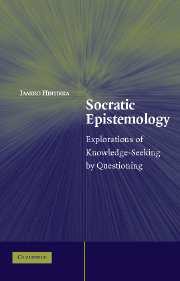Book contents
- Frontmatter
- Contents
- Acknowledgments
- Introduction
- 1 Epistemology without Knowledge and without Belief
- 2 Abduction—Inference, Conjecture, or an Answer to a Question?
- 3 A Second-Generation Epistemic Logic and its General Significance
- 4 Presuppositions and Other Limitations of Inquiry
- 5 The Place of the a priori in Epistemology
- 6 Systems of Visual Identification in Neuroscience: Lessons from Epistemic Logic
- 7 Logical Explanations
- 8 Who Has Kidnapped the Notion of Information?
- 9 A Fallacious Fallacy?
- 10 Omitting Data—Ethical or Strategic Problem?
- Index
- References
1 - Epistemology without Knowledge and without Belief
Published online by Cambridge University Press: 05 June 2012
- Frontmatter
- Contents
- Acknowledgments
- Introduction
- 1 Epistemology without Knowledge and without Belief
- 2 Abduction—Inference, Conjecture, or an Answer to a Question?
- 3 A Second-Generation Epistemic Logic and its General Significance
- 4 Presuppositions and Other Limitations of Inquiry
- 5 The Place of the a priori in Epistemology
- 6 Systems of Visual Identification in Neuroscience: Lessons from Epistemic Logic
- 7 Logical Explanations
- 8 Who Has Kidnapped the Notion of Information?
- 9 A Fallacious Fallacy?
- 10 Omitting Data—Ethical or Strategic Problem?
- Index
- References
Summary
Knowledge and Decision-Making
Epistemology seems to enjoy an unexpectedly glamorous reputation in these days. A few years ago, William Safire wrote a popular novel called The Sleeper Spy. It depicts a distinctly post-Cold War world in which it is no longer easy to tell the good guys—including the good spies—from the bad ones. To emphasize this sea change, Safire tells us that his Russian protagonist has not been trained in the military or in the police, as he would have been in the old days, but as an epistemologist.
But is this with-it image deserved? Would the theory of knowledge that contemporary academic epistemologists cultivate be of any help to a sleeper spy? This question prompts a critical survey of the state of the art or, rather, the state of the theory of knowledge. I submit that the up-to-date image is not accurate and that most of the current epistemological literature deals with unproductive and antiquated questions. This failure is reflected in the concepts that are employed by contemporary epistemologists.
What are those concepts? It is usually thought and said that the most central concepts of epistemology are knowledge and belief. The prominence of these two notions is reflected in the existing literature on epistemology. A large chunk of it consists in discussions of how the concept of knowledge is to be defined or is not to be defined. Are those discussions on the target?
- Type
- Chapter
- Information
- Socratic EpistemologyExplorations of Knowledge-Seeking by Questioning, pp. 11 - 37Publisher: Cambridge University PressPrint publication year: 2007
References
- 6
- Cited by



